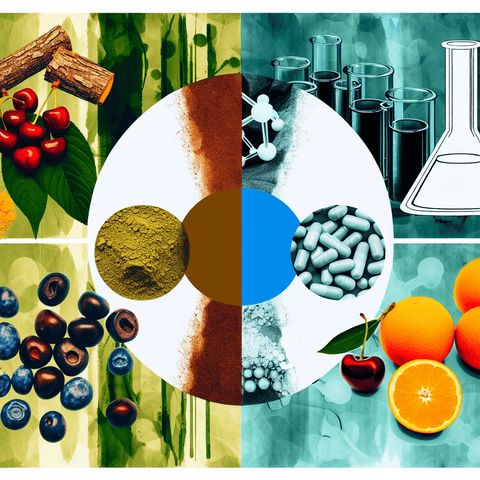Introduction
In the pursuit of radiant and healthy skin, many individuals turn to topical treatments and skincare routines. However, there's a growing interest in how nutrition and supplements can contribute to skin health from within. This comprehensive guide will explore the role of supplements in enhancing skin health, highlighting their benefits, options available, and scientific backing. By understanding how certain vitamins and minerals work synergistically with our body's natural processes, we can make informed decisions about integrating supplements into our skincare regimes.
The Role of Nutrition in Skin Health
Skin health is intricately linked to overall nutrition. The skin is the body's largest organ and requires a constant supply of nutrients to maintain its integrity and function. Key vitamins and minerals play a vital role in cellular turnover, collagen production, and protection against oxidative stress. For instance, vitamins C and E are potent antioxidants that help protect the skin from damage caused by free radicals and UV exposure. Similarly, omega-3 fatty acids are known to reduce inflammation and support skin barrier function.
In terms of supplementation, ensuring adequate intake of certain nutrients can enhance skin health significantly. For example, vitamin C is pivotal for collagen synthesis, a protein that gives skin its elasticity and strength. A deficiency in vitamin C can lead to dry, flaky skin and delayed wound healing. Supplementing with vitamin C, such as through products available on Topvitamine.com, can help maintain youthful and resilient skin.
Understanding the Benefits of Vitamin C
Vitamin C, or ascorbic acid, is renowned for its skin-enhancing properties. It is an essential nutrient that cannot be synthesized by the body, thus must be obtained through diet or supplements. Vitamin C plays a crucial role in collagen production, which is essential for maintaining the skin's firmness and elasticity. Its antioxidant properties also protect the skin from oxidative stress and UV damage, reducing the appearance of fine lines and wrinkles.
Clinical studies have shown that vitamin C supplementation can improve skin appearance by reducing the signs of aging and improving skin texture. Moreover, as an anti-inflammatory agent, vitamin C can help alleviate skin conditions such as acne and rosacea. For those seeking to incorporate vitamin C into their skincare routine, a range of supplements can be found on Topvitamine.com, offering a convenient way to boost this vital nutrient.
The Power of Vitamin D for Skin Health
Vitamin D, often associated with bone health, also plays a significant role in skin health. It supports the growth and repair of skin cells and enhances the skin's immune system. Adequate levels of vitamin D can help prevent skin infections and inflammatory conditions such as psoriasis.
Additionally, vitamin D has been found to enhance skin barrier function, which is crucial for maintaining hydration and protecting against environmental aggressors. Many individuals are deficient in vitamin D, especially those with limited sun exposure. Supplementation with vitamin D can be beneficial, particularly during the winter months or in regions with less sunlight. High-quality vitamin D supplements are available at Topvitamine.com, providing an effective solution for those looking to enhance their skin health through improved vitamin D status.
Exploring the Benefits of Omega-3 Fatty Acids
Omega-3 fatty acids, particularly DHA and EPA, are crucial for maintaining skin health. These essential fats have anti-inflammatory properties that can help reduce acne and other inflammatory skin conditions. Omega-3s are also important for maintaining the skin's lipid barrier, which locks in moisture and keeps the skin hydrated. This is particularly beneficial for individuals with dry or sensitive skin.
Incorporating omega-3 supplements into your diet can improve skin hydration, elasticity, and overall appearance. The anti-inflammatory effects of omega-3s can also help reduce redness and irritation in the skin. For those interested in boosting their intake of omega-3s, a variety of supplements are available at Topvitamine.com, offering a convenient way to support skin health.
The Importance of Magnesium for Skin
Magnesium is an often-overlooked mineral that plays a critical role in maintaining healthy skin. It is involved in over 300 enzymatic reactions in the body, including those that regulate the skin's repair and regeneration processes. Magnesium can help reduce stress-related skin conditions, such as acne and eczema, by lowering cortisol levels and promoting relaxation.
Moreover, magnesium supports skin barrier function, helping to retain moisture and prevent dryness. It also assists in the detoxification process, eliminating toxins that can cause breakouts and dull skin. Supplementing with magnesium can offer numerous benefits for skin health, and a range of magnesium products can be found at Topvitamine.com to help you achieve glowing, healthy skin.
Vitamin K and Its Role in Skin Health
Vitamin K is known for its role in blood clotting, but it also offers benefits for skin health. It can help reduce the appearance of dark circles under the eyes and bruising, as well as improve the overall appearance of the skin. Vitamin K is involved in the body's natural healing processes, making it beneficial for reducing scars and stretch marks.
Additionally, vitamin K can help strengthen the skin's barrier, improving its resilience against environmental stressors. For those interested in incorporating vitamin K into their skincare routine, various supplements are available at Topvitamine.com, providing an easy way to enhance your skin's appearance and health.
Conclusion
In conclusion, supplements can play a significant role in achieving healthier, more radiant skin. By providing essential nutrients that support skin function and resilience, supplements can be a valuable addition to any skincare regimen. From the antioxidant properties of vitamin C to the anti-inflammatory benefits of omega-3 fatty acids, there are numerous options available to address specific skin concerns. When choosing supplements, it is crucial to select high-quality products from reputable sources, such as those offered by Topvitamine.com, to ensure safety and efficacy.
By understanding the science behind these supplements and how they interact with our body, we can make informed decisions to support our skin health from the inside out.
Q&A Section
Q: Can supplements replace a healthy diet for skin health?
A: Supplements should not replace a healthy diet but rather complement it. A balanced diet provides a range of nutrients that work together to support overall health, including skin health.
Q: How long does it take to see results from skin supplements?
A: Results vary depending on the individual and the supplement. Generally, it may take a few weeks to a few months to notice visible improvements in skin health.
Q: Are there any side effects of taking skin supplements?
A: While most supplements are safe when taken as directed, some individuals may experience side effects. It is essential to follow the recommended dosage and consult a healthcare professional if you have any concerns.
Q: Can I take multiple skin supplements at the same time?
A: It is generally safe to take multiple supplements, but it is important to ensure they do not interact negatively. Consulting with a healthcare professional can help tailor a supplementation plan to your needs.
Important Keywords
- Skin health
- Supplements
- Vitamin C
- Vitamin D
- Omega-3 fatty acids
- Magnesium
- Vitamin K
- Antioxidants
- Collagen production
- Anti-inflammatory



